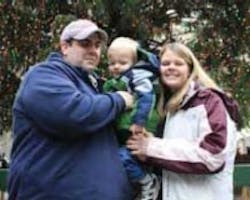Spotlight on NHSC dental hygiene spouses
by Christine Nathe, RDH, MS
[email protected]
This month I decided to follow up on last month's column about the National Health Service Corps (NHSC). I may have detected a trend by doing this. My contact at the NHSC directed me to husband and wife dental hygienists who are working with the NHSC. If you recall, several months ago I spotlighted another husband and wife dental hygiene team working in public health. This month the spotlight is on Bryan Wagner and Danielle Dettra, who work in a Cleveland, Ohio, community dental clinic. They discuss dental hygienists' relationship with the NHSC.
Why did you decide to go into dental hygiene?Danielle: I actually didn't know about dental hygiene until I was in college. My roommate's dad was a dentist and she was thinking about a career in dental hygiene. She told me what the hygienist's responsibilities are and I thought, "Wow, that fits my personality!" I did more research on dental hygiene and the more I found out, the more I liked it, so I applied to Columbus State Community College.
Bryan: I graduated from Ohio State University with a BA in psychology and I took a job at the College of Dentistry at OSU. I was responsible for managing the dental hygiene students' schedules at the clinic's front desk. This is when I decided to go back to school for dental hygiene.
How did you get into dental public health?
Danielle: I always wanted to work in public health. For a couple of years during school I did not have health insurance, so I know how hard it can be to find help. The community health center we work for is so wonderful. Not only does it offer health care to those that have insurance, but they also offer a discounted fee based on income.
The NHSC really helps me stay focused on public health. The program helps to connect primary health-care providers like me with communities where there are shortages. After finding a job at an approved NHSC site, I applied for their loan repayment program. I had $60,000 in debt and was able to pay most of it off with a two-year service commitment.
Bryan: After I graduated from dental hygiene, I began working with the Sealant Program at the Columbus Public Health Department. The program was to place sealants on the teeth of second and sixth graders. The team consisted of one dentist, two hygienists, and two assistants. I also worked for a dentist who accepted government insurance for an underserved population on the west side of Columbus.
Since becoming a dental hygienist, I've wanted to work with underserved populations. The NHSC really opened the door to public health for me. I'm able to do what I love without having to worry about my student loans, since working as part of the NHSC allowed me to pay off my student debt.
What are your current dental positions?
Both: Clinical dental hygienist.
Can you discuss any particularly interesting experiences you've had in your dental public health positions?
Danielle: Every day is interesting! We do more than just dentistry. Most of our patients are medically compromised. We see a lot of patients with hypertension, diabetes, asthma, mental illness, and heart disease. I've had to send people directly to the adult medicine area for high blood pressure, some as high as 190/120.
I've also encouraged patients to quit smoking. I've seen patients from drug rehab centers that are so thankful for our services. The hardest part for me is seeing small children with rampant caries, and trying to teach their parents how to care for the child's mouth. I've also seen many patients in their 20s and 30s that have never had their teeth cleaned.
Bryan: I often have patients who travel as much as an hour and a half to seek dental care! I'm always reminded how much need there is for dental care in our society. Our organization recently sponsored a traveling health clinic called MedWorks. MedWorks moves around the country to provide free dental and medical services with the help of volunteers.
What advice would you give a practicing hygienist thinking of doing something different?
Danielle: Public health is very rewarding, especially when I see the changes I helped make in someone's health. Sometimes we're the only place a person can go. We make it possible for them to get dental care, so they are incredibly appreciative.
It can also be very difficult. Patients are late and break appointments, or they return for their recall only to be in the same condition. Some patients don't want to be here at all, so much of our job is about educating.
Bryan: I would say go for it! I think dental hygienists are excellent critical thinkers. This being said, the practicing hygienist should not feel limited in his or her profession. There seem to be more and more alternative options to private practice for hygienists. The NHSC has been a great experience for Danielle and me. We are much happier in our career than we would have been in private practice.
Christine Nathe, RDH, MS, is a professor and graduate program director at the University of New Mexico, Division of Dental Hygiene, in Albuquerque, N.M. She is also the author of "Dental Public Health Research" (www.prenhall.com/nathe), which is in its third edition with Prentice Hall. She can be reached at [email protected] or (505) 272-8147.
Past RDH Issues

